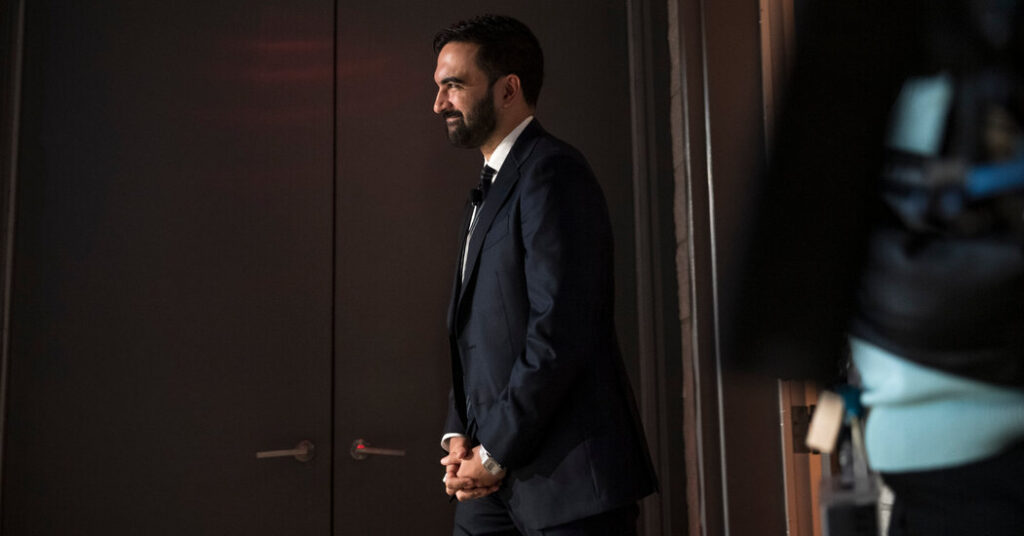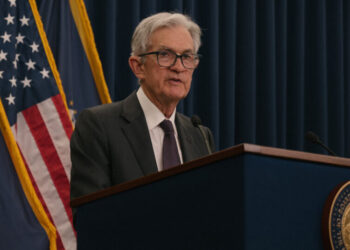For months, as Zohran Mamdani ran for mayor, New York City police officers absorbed his stinging criticisms of the force, his promises to toughen discipline and his plan to send mental health teams, rather than officers, to certain emergencies.
Mr. Mamdani’s opponents predicted an apocalyptic future, with officers fleeing the Police Department in droves. But on Wednesday night, at a community meeting in the Central Park precinct, the police were focused on a less existential challenge: residents’ demands that somebody, somewhere, do something about e-bikes.
“We see that regimes are going to be changing,” Luis Moreira, a detective specialist with the Manhattan North Community Affairs Section, advised residents. “If we start planting seeds with people that will be in charge soon, we can start to get the ball rolling.”
Now that Mr. Mamdani, a 34-year-old democratic socialist, is on the cusp of overseeing a police force of more than 50,000 people, officers of every rank are deciding how to work with his administration.
In interviews last week, union leaders, fraternal organizations, recent retirees and rank-and-file officers described a range of reactions, from uneasiness to open-mindedness. Many said it was too soon to envision Mr. Mamdani’s tenure, while others expressed a readiness to build bridges. But nearly everyone said their daily lives would remain much the same, with their focus on the work of policing and not on who resides in Gracie Mansion.
“To me, he has a clean slate,” said Louis Turco, head of the lieutenants’ union. “I’m willing to work with him, willing to sit down with him about what I think is the best course of action for the N.Y.P.D.”
Mr. Mamdani, who will be sworn in on Jan. 1, has yet to meet with police union leaders. He has said he wants to keep Jessica Tisch, the current police commissioner, and said in an interview broadcast Sunday on WABC-TV that he had met with her last week.
He said his conversation with Ms. Tisch had centered on “what it can look like to continue to deliver public safety and what it could look like, especially without the distractions that we’ve seen over the last few years,” an apparent reference to the allegations of corruption and misconduct involving members of Mayor Eric Adams’s administration, including top police officials.
Before that conversation, the two had not spoken directly since July, when an officer and three others were killed in a shooting at a Park Avenue tower.
Mr. Mamdani’s spokeswoman, Dora Pekec, said representatives for Ms. Tisch and Mr. Mamdani had kept in “close touch.”
The Police Department, America’s largest, operates on a budget of about $6 billion. Ensuring a productive relationship with its roughly 34,000 officers and 15,000 civilians is an essential, if delicate, task for any mayor.
Some have been more successful than others.
Bill de Blasio, who leaned to the left, had a frequently tense relationship with the force, which culminated when two officers were killed during the first year of his term. Officers turned their backs to him when he appeared at the funerals.
Mr. de Blasio’s successor, Mr. Adams, a former police captain and political moderate, identified closely with the force, but his leadership brought about a period of intense upheaval inside the department. Scandals, including accusations of mismanagement and rampant overtime abuse, rocked the agency, and there was a quick succession of leaders that ended with the mayor’s appointment of Ms. Tisch.
Mr. Mamdani, who began his run for mayor as a little-known state assemblyman with a history of activism, faced deep skepticism from police union leaders. He spent much of his campaign trying to mollify people furious about social media posts he had made after the killing of George Floyd in 2020 in which he called the department “anti-queer,” “racist” and “a danger to public safety.” In another post that year, he called for defunding the Police Department. He has since disavowed those statements.
On Friday, when asked during an appearance on Fox 5 how he would show his support for officers, Mr. Mamdani said that the police had been unfairly asked to plug gaps in the social safety net.
“The first thing to be clear about is a recognition of what those officers put on the line every single day when they put their uniforms on, and the importance that we ask them to do that which is possible,” he said.
In interviews, many officers remained irate at Mr. Mamdani’s past statements, but others seemed willing to, if not look past them, take his word that he regretted them. What concerns them more, they said, is how his policies will affect their day-to-day work.
Scott Munro, president of the Detectives’ Endowment Association, said he was unsure what kind of relationship he would have with a Mayor Mamdani. Detective Munro said he was used to being able to call Mr. Adams “any time I want.”
If the union needed a bill pushed through Albany, he said, he could count on Mr. Adams.
“I hope I have that relationship with this guy, but I don’t know,” Detective Munro said. “Call me in two months when we know what the heck is going on.”
Mr. Mamdani has put forth a 17-page plan outlining his vision, including creating a Department of Community Safety that would expand mental health teams that respond to 911 calls. He has also said that he would eliminate the Police Department’s large overtime budget and the Strategic Response Group, a unit that responds to protests.
Many in the force have expressed misgivings about key elements of those plans, especially his support for strengthening the powers of the Civilian Complaint Review Board by giving it the ability to impose discipline on officers rather than just recommending it.
Some officers, however, said they were encouraged by Mr. Mamdani’s appointments of experienced people, pointing to his interest in retaining Commissioner Tisch and his choice of Dean Fuleihan, a well-known veteran of city and state government, as first deputy mayor.
“I’m actually quite optimistic,” said Detective Brian Downey, president of the Gay Officers Action League, a fraternal organization representing L.G.B.T.Q. officers. He said he had appreciated that Mr. Mamdani had personally approached him and other officers when the group was protesting its ban from the annual Pride Parade in June.
“I think we’re off to a good start,” he said.
But others said that Mr. Mamdani’s political ascent had revived a strain of Islamophobia within the department. During the campaign, they said, some officers circulated bigoted memes of Mr. Mamdani on social media, including one that showed the Statue of Liberty covered by a burqa.
“When people go behind the keyboard, sometimes their true colors start coming out,” said Deputy Inspector Waheed Akhter, the president of the Muslim Officers Society, which was formed after the Sept. 11 attacks.
One officer, Sgt. Aaron Lohman, posted a video on Instagram that denounced the memes as “racist” and “anti-Islamic.”
“Not liking somebody’s politics is perfectly fine,” he said in the video. “Being a racist is not fine.” He added: “We work with plenty of Muslim officers out there who are watching what you’re posting. They see it all. What would they have to say about that?”
Inspector Akhter said he and his members were looking forward to working with Mr. Mamdani and were proud to see New York elect its first Muslim mayor. But, he added, that shared faith would not exempt Mr. Mamdani from criticism or being held accountable.
“It definitely opens the door for Muslims, but honestly, we don’t take him any differently,” he said. “If anything, he has more pressure. We hope and pray he doesn’t fail anyone and delivers what he promised.”
Since Mr. Mamdani won, Republican politicians, commentators and conservative-leaning news outlets have said that officers would leave the department in droves.
The agency has been contending with mass departures for years; its ranks have dwindled by more than 6,000 officers from a peak of 40,000 in 2000, though the department announced in August it hired nearly 1,100 recruits. Still, Mr. Mamdani’s victory, some have predicted, would push many to call it a career.
But union leaders and officers said they doubted a political shift would drive mass departures.
“You’re not going to find a foot cop who says I’m leaving because of this mayor,” said Derby St. Fort, a captain who retired in August. “I don’t buy that. The foot cop is leaving because of how he’s treated internally within the job. He’s more worried about how his direct supervisor treats him.”
As officers across the five boroughs readied themselves for Mr. Mamdani’s inauguration and with it the dawn of a new era in New York, more than a dozen who spoke with The New York Times stressed that the everyday pressures on the police tended to be far removed from mayoral politics.
“Police officers aren’t worrying about all of the overly dramatic rumors and predictions,” said Patrick Hendry, the president of the Police Benevolent Association. “They’re worrying whether they’re going to miss another family event because their command is short staffed. They’re worried about getting home safe at the end of their tour.”
Sergeant Lohman, the officer who criticized the memes about Mr. Mamdani, said in a message explaining his post that the first priority was to “protect and serve everyone.”
“Like him or not, he’s our boss,” he said. “And we should all be unified for the greater good of the city.”
Jeffery C. Mays, Shayla Colon and Andy Newman contributed reporting.
Maia Coleman is a reporter for The Times covering the New York Police Department and criminal justice in the New York area.
The post As Mamdani Tries to Woo the N.Y.P.D., He Is Met With Skepticism and Hope appeared first on New York Times.




